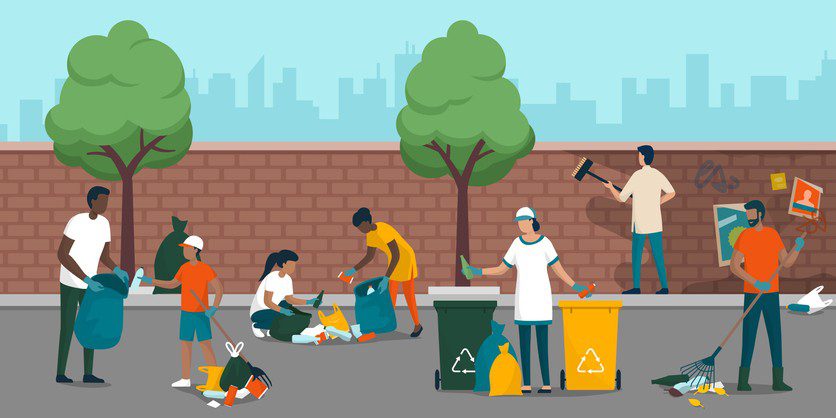 When times are tough, as they certainly have been over the last year, people tend towards one of two camps – those who are predominantly inward-looking, protecting what’s theirs (their home, their family, their friends), and those who are predominantly outward-looking, often focused on helping a wider group.
When times are tough, as they certainly have been over the last year, people tend towards one of two camps – those who are predominantly inward-looking, protecting what’s theirs (their home, their family, their friends), and those who are predominantly outward-looking, often focused on helping a wider group.
These outward-looking individuals can be identified as, amongst other things, the volunteer who trains to become a vaccinator, the neighbour who shops for older or more disadvantaged people in the community, and the fundraisers who raise money for food parcels for those who cannot afford their weekly shop.
Social enterprise entrepreneur Steve Jackson is certainly in the second camp, though he skilfully aligns social values with commercial success. This article takes a look at the rise, fall and rise again of his ventures, the unique nature of his Recycling Lives business, and four ways you can steer your organisation towards more social and community value – as society as a whole has shown a tendency towards those companies that prioritise this commitment.
Social Values: A social enterprise success story
Steve Jackson comes across as a visionary. His blended commercial-social enterprise vision, led by his own personal experiences, has been so successful it has earned him private equity funding, government support and even an OBE.
One of his ventures, Recycling Lives, is a lifeline to those whom society has largely forgotten, giving them skills, opportunities and purpose in order to change their lives around.
In the 1990s, Steve Jackson made his money in the dot-com boom, but an early failure left him virtually penniless and homeless, reliant on the kindness of friends to help him ‘sofa surf’. This early experience of exciting highs and soul crushing lows has stayed with him ever since and has been his inspiration for Recycling Lives.
Jackson said: “I had personal experience of homelessness and depression… I met a lot of people down on their luck. It is incredible how quickly you can find yourselves in that position. People deserve a second chance.”
In 1999 he found commercial success once again, this time trading domain names and earning from their advertising revenue, a move that made him, in his words “a wealthy guy”. This new-found wealth was used to buy a football team, which he proudly took twice to the Premier League play-offs. However, an experience he had volunteering at a homeless charity gave him pause for thought, wondering whether business could do more to help people off the streets, who have been down on their luck or who have taken bad decisions in their lives.
In 2008 he bought half of his family’s scrapyard company and Recycling Lives was established – training homeless people and inmates in prison workshops in new skills they could use to get them off the streets and create opportunities beyond their expectations with a halfway house where they could live when they left prison and a job at Recycling Lives.
Today, the company has a turnover of £170m, with active programmes in around 10% of prisons. Recycling Lives employs around 500 people (approximately 40% of whom are ex-offenders) and they believe they have slashed reoffending rates through the rehabilitative opportunities they have provided.
Collaborations with large companies such as United Utilities have changed the employment landscape for ex-prisoners as some companies have reversed a long-standing policy against employing former offenders in order to be a part of the scheme. And, more recently, Recycling Lives gained £50m of backing from private equity firm Three Hill Capital Partners.
Jackson is passionate, not only about the success of his venture, but in the business model he has championed. A blend of commercial and charity, keeping them separate, though collaborative – operating an independent business that supports the separate charity by buying services from it – is what he thinks makes his business successful where other social enterprises have failed to scale. “The businesses you win contracts from have confidence they’re not dealing with another social enterprise, because there’s a bit of a stigma attached to them of ‘oh crikey are they a woolly organisation that’s going to expect the world without delivering’. If I have one dream, it’s that the model will be copied by others.”
4 steps to ensuring your suppliers reflect your social values ethos
Doing good in society, and being seen to do good, comes with its own issues. We have seen the problems initially faced by brands such as Boohoo and Apple when it was reportedly discovered that those in their supply chain were undertaking questionable practices. As we’ve seen from the recent media attention, when ethical, social and moral questions hang over those you align yourself with, they hang over you too.
So how can you make sure that you select suppliers who will mirror your passion for social enterprise and community value, and that they will remain aligned with the brand values you have chosen to present as integral to your organisation? Often such commitments come with increased regulation, monitoring and contractual expectations.
Having worked on hundreds of complex supplier relationships, we recognise that central to any relationship that asks more from its partners is the matter of ‘trust’. Do you have it, can you inspire it, and can you evidence that the objectives you trust your suppliers to live up to will be respected and rewarded when it exists and that, when compromised, it is identified and rectified to encourage the right collaborative behaviours.
There are four common steps to building levels of commercial trust in every successful example of such a relationship.
-
- Put your preconceptions to one side
To expect trust from your supplier, you must first show them trust. Relationships with suppliers can become strained at times and when this happens, walls go up, communication reduces and a silo culture begins. It’s vital that this cycle is broken, not only for the benefit of your particular relationship, but also if you are going to put in place more collaborative governance measures to steer a supplier in the direction of your ethical commitments, as these may be considered ‘uncomfortable’ by a sceptical supplier, even if they will ultimately lead to a more rewarding partnership for everyone.
To achieve a ‘clean slate’ position with your suppliers, it will require a setting aside of historic grievances and a belief in their capacity, and yours, to work more collaboratively. Letting go and starting again can be the beginning of a new working relationship and evidencing that you are prepared to ‘shift’ your position may be all that’s needed to earn the commercial trust that’s required to stimulate a closer alignment of working practices.
-
- Become a beacon for everything you wish your supplier to align with
If you wish your suppliers to align their commercial ethics with yours, first show your commitment to those ethics yourself. Words are simply not enough. A fancy corporate responsibility page which says all the right things can be easily dismissed as marketing spin. If you want to inspire your suppliers to not only parrot your promises, but also reflect and live them, then you need to ensure that you are able to clearly evidence the actions you are taking to support those social enterprise commitments. The more you do to become a beacon for everything you wish your supplier to align with, the more likely it is that they will.
-
- Clarity and communication build trust
It is an absolute truism that trust is hard-won but easily lost. Trust between individuals can, at times, be challenging, but trust between organisations – with all of their moving parts and opportunities for misunderstanding, mistakes and misjudgement – is so much harder. When it comes to trust there are two things above all others that can make or break your confidence in someone else: the clarity with which you communicate your expectations, and the way you handle issues that arise from their failure to meet those expectations. If commercial trust is important to the creation and maintenance of a relationship that relies on aligned ethics, then it would make sense to build processes into your relationship that encourage greater clarity at every stage and that offer clearer communication protocols when handling issues between you.
-
- Maintain the trust you have earned for the long term
For your supplier to be truly invested in maintaining its commercial trust with you and its alignment to your social values, it’s important to build a culture that promotes the right behaviours and discourages the wrong ones. In simple terms, this means ensuring that you show your suppliers that they are on the right path with adequate praise and rewards to encourage the continuation of the right behaviours and provide them with reason to do so. Let them know they’ve done well and that you trust them to continue doing so.
Conclusion
Steve Jackson’s Recycling Lives organisation shows that it is possible to grow a scalable, successful commercial venture that is rooted deeply in offering social value at its very core.
Recycling Lives not only rebuilds the lives of the homeless and repeat offenders it trains, employs and houses, but also serves an important environmental function by recycling waste for companies such as British Gas and BT. The charity arm of the business seeks to help the poor and vulnerable in society by collecting surplus supermarket foods and providing over a million meals a year to families that need them, reducing food waste in the process.
In recent years it has become increasingly important to have everyone in your supply chain pulling in the same direction. Reputations can be earned or lost based on the quality of the relationships you have with your suppliers and the way they reflect the wider goals and aspirations of your organisation.

